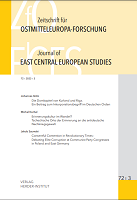Consentful Contention in Revolutionary Times: Debating Elite Corruption at Communist Party Congresses in Poland and East Germany
Consentful Contention in Revolutionary Times: Debating Elite Corruption at Communist Party Congresses in Poland and East Germany
Author(s): Jakub SzumskiSubject(s): Political history, WW II and following years (1940 - 1949), Post-War period (1950 - 1989), Fascism, Nazism and WW II
Published by: Verlag Herder-Institut
Keywords: Corruption; Poland; GDR; congress; communist party; PZPR; SED; contention; revolution;
Summary/Abstract: Existing scholarship treats congresses of the ruling communist parties in the Eastern Bloc as staged performances intended to manufacture support and signal new policy trends. This article, using the examples of extraordinary party congresses held during revolutionary times in Poland (1981) and the German Democratic Republic (1989) offers another perspective. It looks at the events as spaces where rank-and-file delegates could contest particular decisions of their organization, while simultaneously straying away from more radical forms of dissent. This article follows and compares the actions of delegates in both countries by highlighting how they disrupted the agenda of the congresses over the question of elite corruption committed by former members of the party leadership and accountability for these wrongdoings. These episodes show that anti-corruption was a genuinely important moral preoccupation, as well as an argument for demanding change, and that, during the 1980s, ideas grounded in socialism still possessed major legitimacy.
Journal: Zeitschrift für Ostmitteleuropa-Forschung
- Issue Year: 72/2023
- Issue No: 3
- Page Range: 411-436
- Page Count: 26
- Language: English

